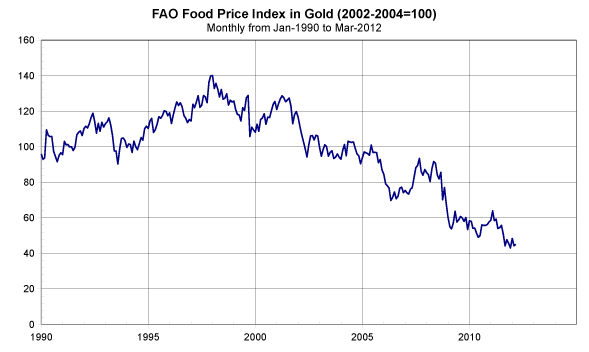
Jim Rogers: Farmers will make ‘huge’ amounts of money… An aging workforce… China pushes agriculture…
- In an interview with China’s national English-language newspaper China Daily, legendary investor and commodities bull Jim Rogers sang the praises of farming. Rogers said you’ll “make a huge amount of money” if you buy a farm and become a farmer today… “The price of your products is going to go up. You’re going to make more and more money every year… The price of your land is going to become more and more valuable.”
- Rogers, ever the contrarian, believes farmers will be some of the most successful people in the world over the next 20 to 30 years. (He noted how terrible the business has been for the past 20 or 30 years.)
- Today, farmers are dying out. The average age of a farmer in America is 58. It’s 66 in Japan. But the world still needs food (more and more, in fact). Still, farming will have to become more profitable in order to attract labor and capital.
- We expect the situation in farming will develop a lot like the mining sector… We discussed the global shortage of mining employees in the November 16, 2011 Digest. As demand and prices for metals increased, the normally low-margin business of mining improved. But the workers weren’t there:
According to Sigurd Mareels, director of global mining for McKinsey & Co., there’s a “historical shortage” of mine workers around the world. Australia, the world’s largest source of iron ore and the second-largest gold producer, needs an additional 86,000 workers by 2020, according to the Minerals Council of Australia. That’s on top of the current work force of 216,000. Miners in Australia – some of whom commute from the Philippines and New Zealand – make between $100,000 and $200,000 a year.
“It’s a tight labor market and difficult cost environment,” said Ian Ashby, president of the iron-ore division at BHP Billiton, the world’s largest miner. To attract workers, BHP and other miners are building recreation centers, sports facilities, and art galleries in mining towns. Costs to attract and pay new talent decreased earnings by $1.2 billion in the first half of 2011. (BHP Billiton still earned $11.2 billion over that period.)
In farming (as with mining), we expect capital will be pulled into the sector as the products become more attractively priced and the return on that capital gets better.
- If you don’t want to become a farmer, don’t worry… There are still ways to profit from the boom. For example… Rogers suggests you can sell seeds, fertilizer, and tractors.
- The biggest driver of food demand is China. Food is one of the first things people spend their money on as they get a little bit wealthier. As China’s economy modernizes, its gigantic population is growing wealthier and will spend some of that money on eating better.
The Chinese government knows the country needs food… It’s already giving incentives to farmers. As we noted during our time in Hong Kong…
Jing Ulrich, the JPMorgan managing director who spoke at the Hong Kong conference, said the Chinese central bank cut the reserve ratio by two percentage points (in addition to the two previous cuts) for several hundred branches of the Agricultural Bank of China earlier this month. Lower reserve ratios mean the bank may hold less of its deposits in reserve, freeing capital for lending.
“It’s March,” she said. “Planting season is coming.” The move will allow the Agricultural Bank to lend more money to the Chinese agricultural sector. The central bank wants to specifically support local agriculture with its latest stimulus efforts.
Jim Rogers also just gave an interview to our own Frank Curzio, editor of Phase 1 Investor and Small Stock Specialist. On the latest installment of Frank’s S&A Investor Radio podcast (now available), Rogers – whose bullish view of gold is well-known – explains why he expects a pullback in the precious metal… and what might lead him to short it. To listen for free to all of Frank’s podcasts, click HERE.













